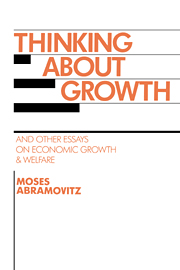Preface
Published online by Cambridge University Press: 22 March 2010
Summary
My interest in economic growth, like that of many other economists, began during World War II. I was involved first with efforts to plan the size of the U.S. war production program, and later with studies of German production capabilities.
How large could the U.S. program be? How much would the economy prove capable of producing if it could be stretched to its limits? The capacity of the U.S. economy had not been tested since 1929. Roosevelt's massive armaments programs were the result of a debate about the growth of U.S. capacity during the dozen years of the Depression. Economists took leading parts in the debate and differed widely. Richard Gilbert and Robert Nathan were among the economist–heroes of that bureaucratic and political struggle. In retrospect, I am convinced that the vision and calculations that backed a very large program were decisive factors in the war. Men and arms had to be deployed and terrible battles had to be fought; but once the huge armament contracts were awarded, it turned out that the capacity to execute them was there. The material advantage of the Allies over the Axis had been created.
Calculations of German production capabilities were far less successful. They rested at bottom on the assumption that the German economy had been fully mobilized when the war began. The high hopes that the British and U.S. governments placed in strategic bombing stemmed from this assumption.
- Type
- Chapter
- Information
- Thinking about GrowthAnd Other Essays on Economic Growth and Welfare, pp. xi - xviiiPublisher: Cambridge University PressPrint publication year: 1989



